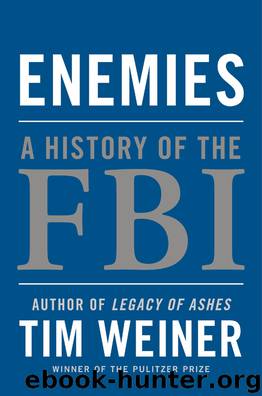Enemies by Tim Weiner

Author:Tim Weiner [Weiner, Tim]
Language: eng
Format: epub, mobi
ISBN: 978-0-679-64389-0
Publisher: Random House Publishing Group
Published: 2012-02-14T05:00:00+00:00
“A PILLAR OF STRENGTH IN A CITY OF WEAK MEN”
Lyndon Johnson renounced his power on March 31, 1968. He said he would not seek reelection. He spoke to the nation on television, his face a crumpled mask of exhaustion, his voice tinged with bitterness and despair.
To LBJ’s anguish, and to Hoover’s anger, Senator Robert F. Kennedy immediately became the front-runner for the Democratic nomination. Both men had good reason to believe that their most bitter political enemy would be the next president. Hoover feared a concomitant surge from the left wing of America, and most of all a rise among the radicals in the black power movement. RFK’s campaign was catalyzing black voters across America; the candidate had a newfound fervor for the politics of liberation.
Four days after LBJ stood down from the presidential election, Hoover wrote to his field agents to be on guard against the forces he had labeled BLACK HATE: “The Negro youth and moderates must be made to understand that if they succumb to revolutionary teaching, they will be dead revolutionaries.”
The next evening, Martin Luther King was assassinated in Memphis.
The killing unleashed unfettered rage across the country; the flames burned close to the White House. Returning from King’s funeral in Memphis, Attorney General Ramsey Clark looked down upon Washington, D.C., from his airplane. The burning city, aglow as night fell, was in the grip of the most dangerous insurrection since the war of 1812. King’s killer, James Earl Ray, eluded the biggest manhunt in FBI history by taking a bus to Toronto and an airplane to London. A Scotland Yard detective arrested him sixty-six days later as he tried to board a flight for Brussels.
On April 23, the Students for a Democratic Society seized Columbia University; six days later police stormed the campus and arrested seven hundred students. It took the FBI ten more days to respond. The response was COINTELPRO—NEW LEFT.
The first wave of the FBI’s national attack on the antiwar movement included explicit instructions from Hoover and Sullivan to all field offices: Instigate conflicts among New Left leaders. Exploit the rifts between SDS and its rival factions. Create the false impression that an FBI agent stood behind every mailbox, that informants riddled their ranks. Use disinformation to disrupt them. Drive them mad. But COINTELPRO was behind the curve. More than one hundred campuses across the country had already been hit by student protests. The marches were breaking barricades, and at their fringes were militants willing to toss Molotov cocktails and more. Hoover sent out a fierce call to arms for his special agents in charge across America. “I have been appalled by the reaction of some of our field offices to some of the acts of violence and terrorism which have occurred … on college campuses,” he wrote. “I expect an immediate and aggressive response.”
Hoover saw a gathering storm unlike anything since the great police, coal, and steel strikes that swept the nation as the American Left rose up after World War I. But the FBI had no answer to the violence and rage that shook America that spring.
Download
This site does not store any files on its server. We only index and link to content provided by other sites. Please contact the content providers to delete copyright contents if any and email us, we'll remove relevant links or contents immediately.
The Borden Murders by Sarah Miller(3985)
The Secret Barrister by The Secret Barrister(3401)
Coroner's Journal by Louis Cataldie(2347)
Police Exams Prep 2018-2019 by Kaplan Test Prep(2334)
The Splendid and the Vile by Erik Larson(2200)
Terrorist Cop by Mordecai Dzikansky & ROBERT SLATER(1947)
My Dark Places by James Ellroy(1785)
A Colony in a Nation by Chris Hayes(1776)
Black Klansman by Ron Stallworth(1683)
The Art of Flight by unknow(1646)
A Life of Crime by Harry Ognall(1582)
Objection! by Nancy Grace(1552)
The New Jim Crow by Michelle Alexander(1542)
Whoever Fights Monsters by Robert K. Ressler(1520)
Anatomy of Injustice by Raymond Bonner(1504)
Invisible Women by Caroline Criado Perez;(1481)
Obsession (The Volkov Mafia Series Book 1) by S.E Foster(1480)
American Prison by Shane Bauer(1469)
A is for Arsenic: The Poisons of Agatha Christie (Bloomsbury Sigma) by Kathryn Harkup(1439)
